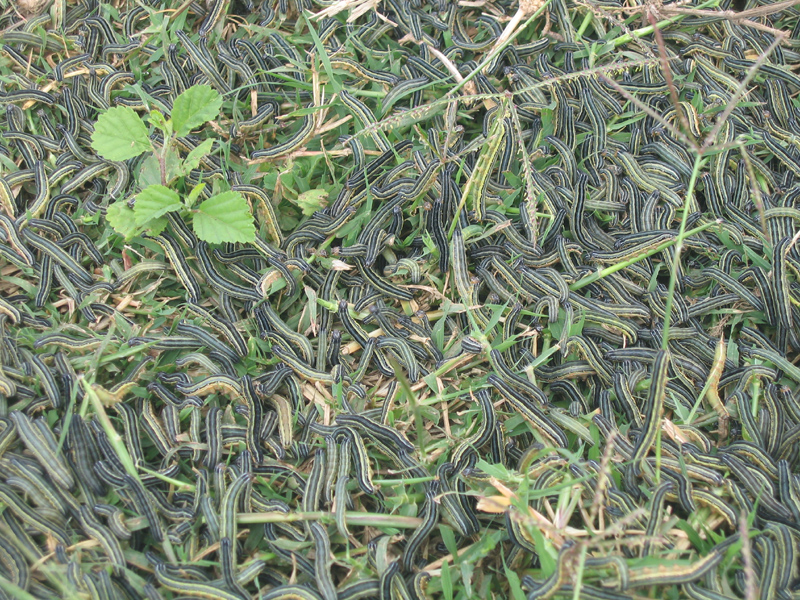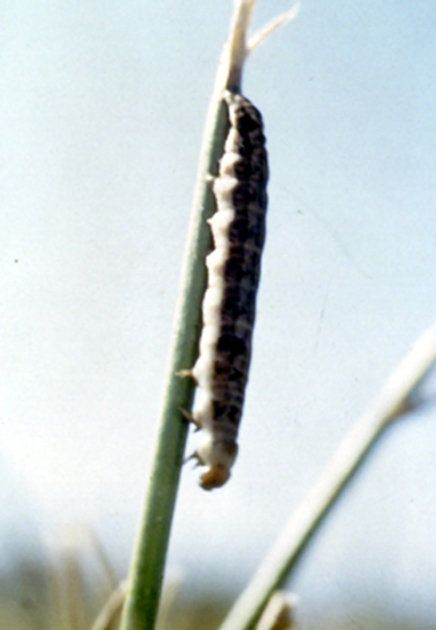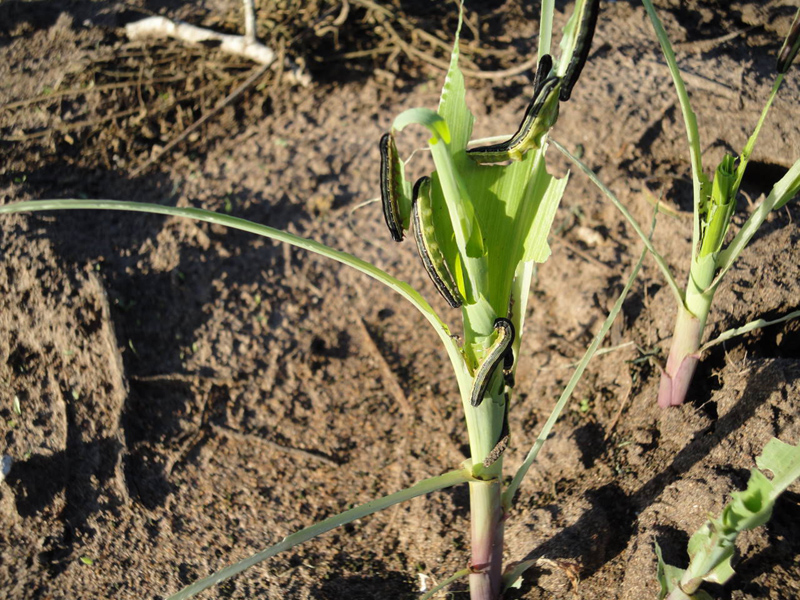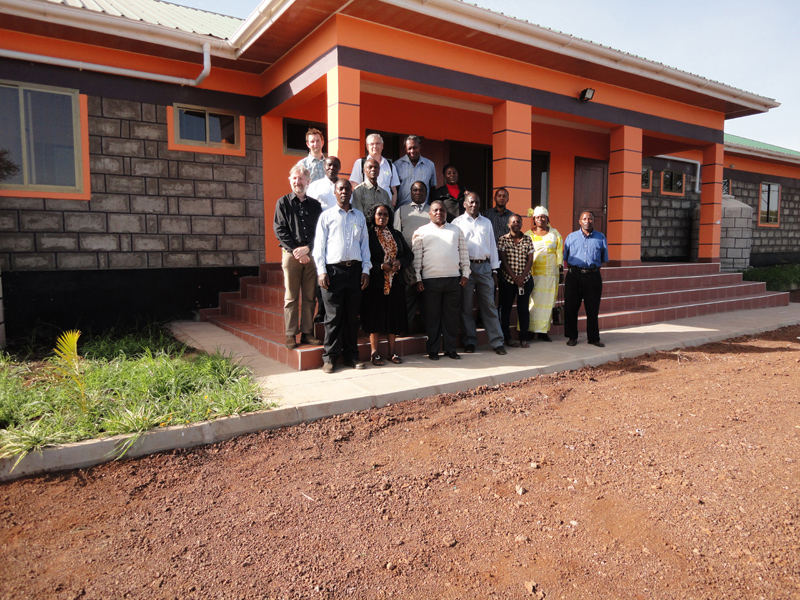
In Arusha, Tanzania, a new facility has been built for the mass production of a biological control agent for African armyworm with technical help from David Grzywacz and colleagues at NRI.
This is the first biological control production laboratory in Tanzania and is the culmination of a series of research projects lead by NRI that pioneered the use of biological control for African armyworm. This initiative to bring the fruits of earlier sponsored research into practical use was funded by the DFID Research into Use Programme (RIU). Dr Andy Frost (Deputy Director, RIU) comments "this initiative brings good science (from UK Research Council and DFID funded projects) into meaningful use adopting a much more business-like approach – whilst the commercial operation is very much in its infancy, the future is very positive and it will bring about sustainable benefits for poor farmers in the region". The facility will be operated by a local Tanzanian company Eco Agri Consultancy Services Ltd, whose director Mr Wilfred Mushobozi was a very active partner during research said "The research outputs generated from these projects are of critical importance in addressing armyworm challenges in the region".
 The African armyworm Spodoptera exempta is a major migratory crop pest over much of Eastern and Southern Africa. Crops are damaged by plagues of the armyworm caterpillars, which at densities 100-1000 per m2 destroy staple grain crops such as maize, wheat, rice and strip pastures. After each outbreak the larvae pupate in the ground and later the emergent swarms of moths move to new areas following the seasonal rains. Armyworm outbreaks disperse from the primary outbreak areas in Tanzania and Kenya and may spread to other vulnerable countries in sub-Saharan Africa. In serious outbreak years, hundreds of thousands of hectares of can be attacked and damaged over the six to eight month armyworm season and this poses a serious threat to the food security of millions of people. Control of these armyworm plagues has been reliant on the spraying of chemical pesticide. However, the high cost and limited availability of chemical pesticides means that up to 70% of subsistence farmers in outbreak areas cannot access pesticide. International aid donors are also unwilling to fund the purchase of chemical pesticides for armyworm control due to environmental concerns about their wide scale use in areas of rich biodiversity.
The African armyworm Spodoptera exempta is a major migratory crop pest over much of Eastern and Southern Africa. Crops are damaged by plagues of the armyworm caterpillars, which at densities 100-1000 per m2 destroy staple grain crops such as maize, wheat, rice and strip pastures. After each outbreak the larvae pupate in the ground and later the emergent swarms of moths move to new areas following the seasonal rains. Armyworm outbreaks disperse from the primary outbreak areas in Tanzania and Kenya and may spread to other vulnerable countries in sub-Saharan Africa. In serious outbreak years, hundreds of thousands of hectares of can be attacked and damaged over the six to eight month armyworm season and this poses a serious threat to the food security of millions of people. Control of these armyworm plagues has been reliant on the spraying of chemical pesticide. However, the high cost and limited availability of chemical pesticides means that up to 70% of subsistence farmers in outbreak areas cannot access pesticide. International aid donors are also unwilling to fund the purchase of chemical pesticides for armyworm control due to environmental concerns about their wide scale use in areas of rich biodiversity.
 The biological control of armyworm is based on the use of the Spodoptera exempta nucleopolyhedrovirus (SpexNPV). This is a virus disease that is specific to African armyworm and completely safe for non-target insects, wildlife, livestock and humans. This virus can naturally appear in armyworm outbreaks spreading rapidly and quickly killing up to 98% of the larvae, however its natural appearance is usually too late in the season to prevent crop damage or halt armyworm spread. Research has shown that by spraying outbreaks with SpexNPV they can be destroyed as effectively as with pesticides1 without any of the negative environmental impact of chemical pesticides. Key research identified how to produce SpexNPV in the laboratory or field3 2 and this knowledge will be applied to mass produce it in the new facility more cheaply than chemical pesticides.
The biological control of armyworm is based on the use of the Spodoptera exempta nucleopolyhedrovirus (SpexNPV). This is a virus disease that is specific to African armyworm and completely safe for non-target insects, wildlife, livestock and humans. This virus can naturally appear in armyworm outbreaks spreading rapidly and quickly killing up to 98% of the larvae, however its natural appearance is usually too late in the season to prevent crop damage or halt armyworm spread. Research has shown that by spraying outbreaks with SpexNPV they can be destroyed as effectively as with pesticides1 without any of the negative environmental impact of chemical pesticides. Key research identified how to produce SpexNPV in the laboratory or field3 2 and this knowledge will be applied to mass produce it in the new facility more cheaply than chemical pesticides.
 The new facility draws on the knowledge generated by earlier NRI projects and also the recent BBSRC-DFID project on armyworm baculovirus ecology led by Professor Kenneth Wilson of Lancaster University and in which NRI was a partner. Professor Wilson's BBSRC project untangled the epidemiology of natural SpexNPV outbreaks and also developed an armyworm forecasting database which promises to be a key tool in helping to forecast, locate and treat outbreaks in time to maximise the effectiveness of the biocontrol agent preventing crop damage and the further spread of armyworm outbreaks. Prof Wilson said "This successful collaboration between NRI, Eco Agri Consultancy Services Ltd and Lancaster University has demonstrated that long-term projects by partners in the north and south that integrate high-quality science and fundamental research can bring immense benefits for resource-poor farmers in Africa".
The new facility draws on the knowledge generated by earlier NRI projects and also the recent BBSRC-DFID project on armyworm baculovirus ecology led by Professor Kenneth Wilson of Lancaster University and in which NRI was a partner. Professor Wilson's BBSRC project untangled the epidemiology of natural SpexNPV outbreaks and also developed an armyworm forecasting database which promises to be a key tool in helping to forecast, locate and treat outbreaks in time to maximise the effectiveness of the biocontrol agent preventing crop damage and the further spread of armyworm outbreaks. Prof Wilson said "This successful collaboration between NRI, Eco Agri Consultancy Services Ltd and Lancaster University has demonstrated that long-term projects by partners in the north and south that integrate high-quality science and fundamental research can bring immense benefits for resource-poor farmers in Africa".
As well as producing SpexNPV for armyworm control it is planned that the new facility will also promote and distribute other biological pesticides and biotechnology products urgently needed by Tanzanian farmers for the safe control of many crop and horticultural pests. This will help Tanzania to not only solve its food security problems, but also to expand its horticultural export industry to generate local economic growth and employment.
- Grzywacz, D., Mushobozi, W.L., Parnell, M., Jolliffe, F., and Wilson K., (2008). The evaluation of Spodoptera exempta nucleopolyhedrovirus (SpexNPV) for the field control of African armyworm (Spodoptera exempta) in Tanzania. Crop Protection, 27, 17-24
- Mushobozi WL, Grzywacz D, Musebe R, Kimani M & Wilson K (2005) New approaches to improve the livelihoods of poor farmers and pastoralists in Tanzania through monitoring and control of African armyworm, Spodoptera exampta. Aspects of Applied Biology 75: 37-45
- Cherry A. J. Parnell M, Grzywacz D, Brown M & Jones K A (1997) The optimization of in vivo nuclear polyhedrosis virus production of Spodoptera exempta (Walker) and Spodoptera exigua (Hubner). Journal of Invertebrate Pathology, 70, 50-58

